As I write this, #metoo, is trending on social media. This is a movement of women speaking up about the sexual abuse that they have suffered and ultimately stepping out from behind the veil of shame. A movement like this can help someone who has never shared their story to know that they are not alone in suffering.
A movement like this can also bring up experiences that have been hidden or lain dormant for many years. This can be so frightening. This can be so freeing. I have read the details of sexual abuse perpetrated against numerous friends. Some of these stories I know, some are shocking, and all of them are heartbreaking. There are other #metoo posts, like the one from a childhood friend who says he will do more to stop the culture of objectification and violence and to hold other men responsible for perpetuating that culture. Or the post from my brother who is angered over a society in which women feel shame for being abused and can’t expose their abusers.
A discussion like this is important as it moves society forward. It also triggers people. It may even be triggering you to read this right now. So, I take this space not to tell you my story, not to fix the situation, nor to offer my own solutions. Rather, I offer tools for practice self-care so that we can continue to hold space for others and ourselves while remaining centered.
- Fixing is not listening. Sometimes we try to fix how another person is feeling (we might offer solutions, tell them how they should feel, or play devil’s advocate) because their suffering makes us feel uncomfortable.
- Listen to your own feelings. How does this all make you feel? Where in the body do you feel it? Your feelings are a barometer for how much we can listen to and how much we can help.
- It is okay to take a timeout. If you are feeling overwhelmed, take a step back. There is no shame in taking care of yourself.
- Fill your own cup. We cannot fill another’s cup from an empty cup. This means that self-care is paramount. When you take your break use practices that allow you to feel your feelings. Go for a walk, sit outside in nature, go to a yoga class, do some breathing exercises, meditate, get a hug – these are some examples of self-care strategies that help to fortify your energy and the emotional body.
- Ask for help. Knowing when to ask for help is an important practice. You are not alone in your struggles!
Use the resources found below and on the website. We have free practices, CDs, DVDs, books, workshops, and a list of practitioners.
If you are feeling overwhelmed and need immediate help, support from qualified professionals at RAINN is a phone call or online chat away 800.656.4673, www.rainn.org
Research: Injuries Associated with Yoga Practice
This research study was a review of observational studies on the adverse events occurring during yoga practice and compared to adverse events of non-yoga practitioners. The conclusions of this study were that a considerable amount of yoga practitioners experience an adverse event in yoga but most were mild and transient. The researchers conclude that this should not stop healthy individuals from practicing yoga.
This study was included in this newsletter for several reasons. First, it is important that we acknowledge that yoga postures are difficult and come with a certain amount of risk. Second, at LifeForce Yoga, we work to make the practice safe and accessible to ALL bodies, not just those that are fit. While every practice has an inherent risk, we work to teach breathing, hand gestures, sound, relaxation, etc. in such a way that the risk of injury or adverse events is limited.
https://www.ncbi.nlm.nih.gov/pubmed/28958637
Research: Effect of yoga and aerobic exercise on sleep quality in women with Type 2 diabetes
In this randomized study the effects of 12 weeks of yoga, 12 weeks running on a treadmill, versus 12 weeks of no intervention (the control group) were studied in women with Type 2 diabetes. The overall score of sleep quality in the yoga group improved at six weeks and at 12 weeks. Those in the exercise group (running on the treadmill) also saw an improvement at week six, but that improvement was diminished at 12 weeks. The researchers concluded that yoga is more effective at improving the sleep quality in women with Type 2 diabetes.
The yoga practice in this study included supine poses, standing poses, heart openers, forward bends, an inversion, as well as sun salutations. The breathing practices in the protocol included 15 minutes of sitkari (like pursed-lip breathing, but on the inhale) and bee breath. 10 minutes for Alternate Nostril Breath, kapalabhati (a vigorous breath), and relaxation pose. This was followed by a yoga nidra.
The yoga practice given is a well-balanced yoga class. Just think, if these women saw a benefit from the yoga on their sleep, maybe yoga class would help you!
https://www.ncbi.nlm.nih.gov/pmc/articles/PMC5612039/
Accessible Yoga Conference
This month I presented at the Accessible Yoga Conference in San Francisco! Accessible Yoga, founded and directed by Jivana Heyman, is an international grassroots organization dedicated to sharing yoga with everyone. This conference brings together a wide assortment of teachers and practitioners, all of whom have a shared goal of bringing yoga to all, “if you have a body and you have a mind, you can practice yoga.” This conference is run by a team of volunteers, yet you wouldn’t know it. The conference was laid back, friendly, and all events began and ended on time.
There were two prominent themes that ran through the conference. The first was connection, to self and to others. The opening session began with the connection to self through a meditation led by Swami Ramananda of Integral Yoga. After remarks from Jivana Heyman, we were asked to meet and connect with people around us. This experience of connecting with others was repeated throughout the conference, at meals, and outside of the conference. It was one of the friendliest environments I have been in!
Practice: Alternate Nostril
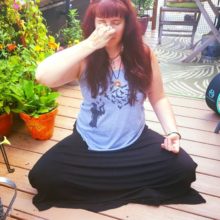 At an event, September 7th, Hillary Clinton shared some of the tools she used to overcome her disappointment at losing the election to Donald Trump. She said, “I did some yoga. I tried alternate nostril breathing. I highly recommend it. It kind of calms you down.” She also used prayer, friendship, readings, and a “fair share of chardonnay.” Through her process of self-care, Clinton discovered something that yogis have known for thousands of years: that yoga breathing gives the practitioner the power to calm themselves down.
At an event, September 7th, Hillary Clinton shared some of the tools she used to overcome her disappointment at losing the election to Donald Trump. She said, “I did some yoga. I tried alternate nostril breathing. I highly recommend it. It kind of calms you down.” She also used prayer, friendship, readings, and a “fair share of chardonnay.” Through her process of self-care, Clinton discovered something that yogis have known for thousands of years: that yoga breathing gives the practitioner the power to calm themselves down.
But what is Alternate Nostril Breathing and why would it work?
Alternate Nostril, known as Nādī Shodhana in yoga, is the process of alternating the breath in the nostrils as an act of clearing the energy channels, or nādīs, in the body. The beauty of this practice is that you don’t have to believe in energy channels for it to work. Research has shown that the practice lowers the blood pressure (Telles, et. al., 2014 & Telles, et.al., 2013), calms the mind better than quiet sitting (Telles, et. al., 2017), tones the parasympathetic nervous system known as the relaxation response (Sinha, et. al., 2013), changes the heart rate variability (Subramanian, et. al., 2016; Ghiya, et. al., 2012)as well as a number of other benefits (research on alternate nostril breathing).
Read on, including a led practice of Alternate Nostril…
Announcing our FREE Webinar Series!
We are pleased to announce a free webinar series on LifeForce Yoga starting next month. Every two months, LifeForce Yoga Director Rose Kress will have a new guest in a free one-hour webinar open to the public. These webinars discuss LifeForce Yoga tools, techniques, and their application in different settings. Our very first webinar is LifeForce Yoga & Emotional Regulation in a Trauma Setting with Alyce Wellons, LCSW, LFYP.
Register today to reserve your spot, space is limited! Once registered, the recording will be available to watch for one-week. After that week, the webinar will be available for purchase and download in our store.
NEW! Complete Mudra Webinar Now Available for Download
LifeForce Yoga Mudras – Hand Gestures to Manage Your Mood:
Cultivating Peace with Breath, Hand Gesture, Sound, Imagery, and Scent
Led by Rose Kress, Director of LifeForce Yoga
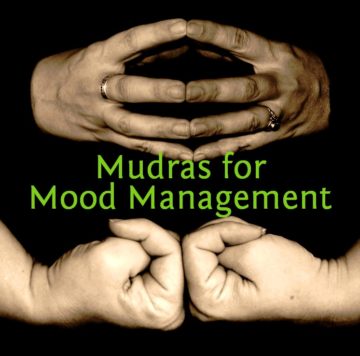 5 Sessions, 6 Hours of Content
5 Sessions, 6 Hours of Content
Also Included Bonus Session: Incorporating Essential Oils into Your Mudra Practice
6 Yoga Alliance CEUs, 6 IAYT CEUs
Cost: $129
Hand gestures, called mudras, can change the breath and energy states. They are a yoga practice that is portable and mudras can be practiced anywhere, anytime. With 2500 nerve receptors per square inch, our sensitive hands are an opportunity to bring the mind to a focal point. Every individual receives the effect of the mudra in a similar way, while subtle differences may be present. These hand gestures have a long tradition of practice within yoga and Buddhism. Mudras exist within Western culture, too, such as the peace sign, the OK sign, and even that hand gesture that we use when driving to signal anger and aggression.
In this powerful online program, experience the influence of mudras on your mood state. Each session has a different theme with 4 – 5 different mudras. These mudras are categorized for ease of teaching. However, you may find a mudra to be profound when you do not expect it.
This webinar was recorded over the summer and loved by all participants! Includes a manual with history, philosophy, and resources.
Order your course here.
LifeForce Yoga Practitioner Retreat and Level 1 Training
Tucson, Arizona
January 21 – 28, 2018
Registration for our Annual Tucson Winter Training Retreat is now open!
LifeForce Yoga Practitioner (LFYP) Training is open to all and offers certification for Health and Yoga Professionals. Our practice blends ancient disciplines with current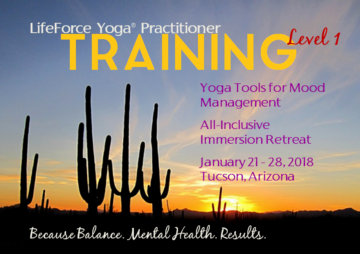 research in psycho-neurobiology to provide evidence-based support that helps to clear obstructions (chronic tensions, constricting beliefs, limiting emotions) that may be keeping you, and those you serve, from knowing and expressing your fullest potential. We have trainings throughout the year, but this one is an opportunity to dive into LifeForce Yoga like never before. You will learn how to integrate evidence-based yoga techniques, other than posture, into yoga classes, clinical settings, groups, etc. Our home-turf desert setting offers you the opportunity to retreat & renew through LifeForce Yoga techniques while learning how to bring these tools to those that you serve. You will feel lighter, brighter, and filled with enthusiasm for your home practice of self-care.
research in psycho-neurobiology to provide evidence-based support that helps to clear obstructions (chronic tensions, constricting beliefs, limiting emotions) that may be keeping you, and those you serve, from knowing and expressing your fullest potential. We have trainings throughout the year, but this one is an opportunity to dive into LifeForce Yoga like never before. You will learn how to integrate evidence-based yoga techniques, other than posture, into yoga classes, clinical settings, groups, etc. Our home-turf desert setting offers you the opportunity to retreat & renew through LifeForce Yoga techniques while learning how to bring these tools to those that you serve. You will feel lighter, brighter, and filled with enthusiasm for your home practice of self-care.
Join Rose Kress, Director of LifeForce Yoga; Amy Weintraub, LifeForce Yoga founder and author of Yoga for Depression and Yoga Skills for Therapists; and Senior LFYP Mentor Randy Todd, LICSW, RYT, for a training immersion like no other. Faculty info
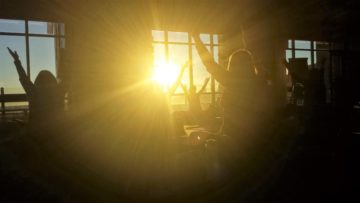 Days begin with an early morning guided yoga, meditation, and chanting practice, followed by a silent breakfast. Daily sessions include evidence-based experiential techniques, demonstrations, and practicing in partners. Afternoons are for self-care: we walk, hike, study, and relax with a daily yoga nidra. Evenings can include guest lectures and moonlit labyrinth walks. A 160-page manual with pictures, explanations, and scripts is included.
Days begin with an early morning guided yoga, meditation, and chanting practice, followed by a silent breakfast. Daily sessions include evidence-based experiential techniques, demonstrations, and practicing in partners. Afternoons are for self-care: we walk, hike, study, and relax with a daily yoga nidra. Evenings can include guest lectures and moonlit labyrinth walks. A 160-page manual with pictures, explanations, and scripts is included.
Winter in Tucson includes highs in the 70s and plenty of sunshine. Days include a two and a half hour break for lunch so you can enjoy the sunshine with hiking and outdoor breathing practices. Stay a couple of days later and enjoy the Tucson Gem and Mineral Show; stock up on crystals, singing bowls, gems, trinkets, gifts and other fun stuff. Private and shared accommodations, all include a private bathroom. We only have a few single rooms left, sign up today to make sure you get one!!
CEUs for mental health professionals, yoga therapists, and yoga teachers.
Contact us about payment plans.
Review: Pathways to a Centered Body: Gentle Yoga Therapy for Core Stability, Healing Back Pain, and Moving with Ease by Donna Farhi and Leila Stuart
Reviewed by Rose Kress
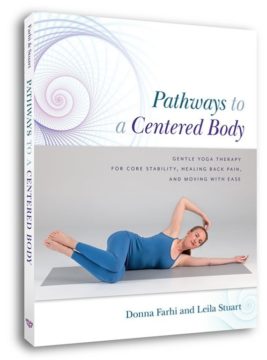
Have you ever had the experience of trying to center yourself but your mind feels scattered, or you keep remembering things you need to do? Maybe you go to sit and you become so distracted that you end up doing something different. Or maybe “being centered” seems so far off, it’s not even worth trying for. Perhaps it is the body that feels disconnected and scattered. In Pathways to a Centered Body, Donna Farhi and Leila Stuart provide gentle opportunities for working with the body, specifically the psoas muscle, to help you feel more grounded, centered, and even secure.
“Core” fitness has become a buzzword that often alludes to flat and strong abdominal muscles. As the authors point out, the practices have “limited efficacy because they neglect to address the deeper foundation muscles that form the scaffolding for a truly centered pelvis and upright spine” (1). The authors are speaking about the iliopsoas muscle. Farhi and Stuart do an amazing job walking the lay person through the structure of these deep core muscles in Chapter Two.
Read full review…
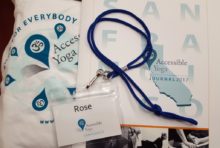
As always, thank you Rose for useful, interesting and comforting information. I appreciate your essay on the #metoo movement. Support for all individuals affected by abuse is critical.
You’re welcome, and thank you Ginny!